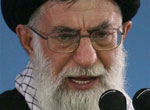 AFP: Iran’s top decision-maker Ayatollah Ali Khamenei said Monday that nuclear talks with world powers would “lead nowhere” but that he was not opposed to them.
AFP: Iran’s top decision-maker Ayatollah Ali Khamenei said Monday that nuclear talks with world powers would “lead nowhere” but that he was not opposed to them.
By Siavosh Ghazi

Tehran (AFP)— Iran’s top decision-maker Ayatollah Ali Khamenei said Monday that nuclear talks with world powers would “lead nowhere” but that he was not opposed to them.
Iran is due to resume talks on Tuesday in Vienna with the P5+1 group — Britain, France, the United States, Russia and China plus Germany — aimed at reaching a comprehensive accord on its controversial nuclear programme.
After a decade of failure and rising tensions, US President Barack Obama has put the chances of an agreement at “50-50”, while Iranian Foreign Minister Mohammad Javad Zarif has predicted “difficult” discussions.
“I repeat it again that I am not optimistic about the negotiations and they will lead nowhere, but I am not against them,? Khamenei said in remarks published on his website Khamenei.ir.
Under a landmark interim deal clinched in November, Iran agreed to freeze some nuclear activities for six months in exchange for modest sanctions relief and a promise by Western powers not to impose new restrictions on its hard-hit economy.
Western powers and Israel have long suspected Iran is pursuing a nuclear weapons capability alongside its civilian programme, charges denied by Tehran.
Under the “comprehensive” deal now being sought, which the parties aim to conclude and commence implementing by November, the powers will want Iran to scale back its activities permanently.
These might include closing the underground Fordo facility, slashing the number of centrifuges used to enrich uranium, reducing its stockpile of fissile material and altering a new reactor being built at Arak, diplomats say.
In exchange, Iran would see all UN Security Council, US and EU sanctions lifted.
Khamenei said Iran would abide by its pledge to pursue the negotiations, adding that Iranian officials should “continue their efforts.”
“The work that has been started by the foreign ministry will continue and Iran will not violate its commitment, but I repeat it again, it will lead to nowhere,” Khamenei said.
Iran “will never succumb to the bullying and blackmailing of America,” which Khamenei said uses the nuclear issue as a pretext to pursue hostile policies towards Iran.
“The nuclear issue is an excuse for America (to continue) its animosity. Now, the American spokesmen are bringing up the issues of human rights and missiles.”
– ‘Hedging his bets’ –
Khamenei’s remarks on eve of nuclear talks were seen by analysts as a warning to Washington in case the negotiations fail.
“Ayatollah Khamenei wanted to emphasise that Iran will continue the negotiations based on the logic of a win-win situation,” Amir Mohebian, an analyst close to Iran’s conservative camp, told AFP.
“It can be stopped if this logic is not respected, and the Americans will be held accountable for it,” he added.
Alireza Nader, an analyst at the Rand Corporation, a US-based think tank, said Khamenei’s support for the negotiations is rooted in his desire to ease the pressure of crippling economic sanctions.
“Khamenei is genuinely sceptical of the talks, and is very distrustful of the US,” he told AFP.
“I see the statement as him hedging his bets. He’ll support negotiations, but if they fail he can blame someone else, whether the US or (Iranian President Hassan) Rouhani.”
Rouhani, a relative moderate elected last year on vows to engage the West, revived the nuclear negotiations after years of stalemate under his hardline predecessor Mahmoud Ahmadinejad and thus far enjoys the support of Khamenei.
US officials have said Iran should address concerns over its ballistic missile programme in any comprehensive deal and that pressure should be maintained on Tehran over its alleged violations of human rights.
But Zarif reiterated on Monday that those topics were not up for discussion.
“These issues are not relevant topics for these negotiations. We insist on discussing the issues which were agreed upon in the last round of talks,” Zarif, Iran’s foreign minister and lead negotiator, told state news agency IRNA.
When asked whether he had full authority for the negotiations, the foreign minister said he had a “defined framework.?
“The supreme leader sets the major policies, the president sets the necessary framework for executing them and we at the foreign ministry are responsible for implementing these policies,” he said.


